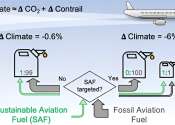Engineering students invent a quieter leaf blower
The challenge before Johns Hopkins University engineering students: Take a leaf blower, but make it quiet. Make it work as powerfully as ever, but do not allow it to emit the ear-piercing caterwaul that has gotten leaf blowers ...
May 14, 2024
1
42





